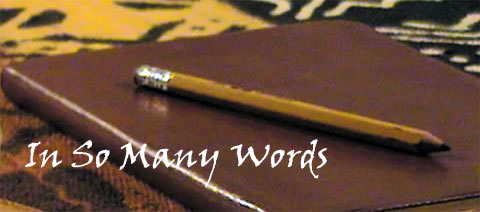
In So Many Words
In his book, The Road Less Traveled, Scott Peck's first sentence is the somber observation, "Life is difficult." Direct and honest, it is a reality worth mulling over because, though we all know and have experienced that life is indeed hard, nevertheless there is a widespread belief that we have a right to be happy and that pain, distress and hurts are to be shunned. We should be free of anxieties and conflicts. We have a right to the good life. How quickly we want to take away the pain, to give the answers, to be distracted.
In a culture where very often the only solution to a difficult relationship is to walk away, where the idea is common that stress and conflict have no place in a "normal" life, where at the hint of boredom a job, a home, a friend can be dropped so as to move on to more exciting places, in such a culture pain and darkness have no place. To imagine, even for a moment that trouble and affliction may have something to teach us is beyond the scope of many.
Perhaps this attitude is in part a reaction to a time when, in a warped understanding of the Passion of Jesus, suffering was glorified as an end in itself. "The will of God" was the code phrase for all the bad things that befell one, things to be endured stoically and without complaint. This world was a valley of tears to be suffered through until we reached heaven after our death. For many the joy of the Gospel message remained hidden. They felt guilt ridden, concentrating on sins and failures and forgetting the compassionate Father of the prodigal son.
To imagine, even for a moment that trouble and affliction have something to teach us is beyond the scope of many.
Today when our focus is more on pleasure, not sin, the Father is also forgotten. When the prodigal son reached rock bottom he knew something had to be done and he made the wisest decision of his life. "I will get up and go to my Father." (Luke 15) But how many, no longer knowing the Father, keep on spinning, desperately seeking happiness in one pursuit or another. Frenetic activity becomes a way to escape the pain of life. If we are assaulted on every side by an endless variety of distractions our "inner self " will never grow strong and, in a very real sense, we will never come to know our true nature.
So it is no small grace when we are downsized, so to speak. The jobs, the perks, the distractions are gone, and we are left with what? The prodigal son "came to his senses," and, by God's grace, we too will wake up. We will not find it easy; we will not walk on roses. Anger, resentments, and depression at our change of fortune will at times almost drown us. But God is in all this and will bring us through dark and difficult times if we trust Him and learn what the pain has to teach us. In this darkness new insights are born, and we emerge humbler and wiser people. Scott Peck is right, life is difficult. But these very difficulties can be blessings, stepping stones to maturity, means of growth, the beginning of a new and better life.
Columban Sr. Redempta Twomey lives and works in Ireland.